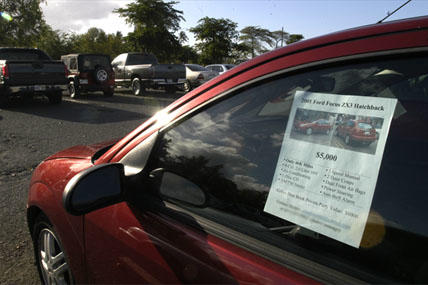If you have had trouble getting approved for a mortgage, a credit card or a personal loan recently because your credit isn’t up to par, you aren’t alone. We get readers writing to us often in our Credit.com Forum about their trouble getting access to credit, but one type of loan is already opening up again to non-prime consumers -- auto loans.
Auto loans are some of the only financial products that are currently opening up to the non-prime borrower, according to the most recent Experian-Oliver Wyman Market Intelligence report. The report found that even consumers with the worst Vantage scores -- F-level borrowers -- were still getting access to auto loans with an average balance of $15,300. (If you want to know what your own credit grade is, check out your Credit Report Card.) And auto loan originations have been on the rise for the past few years as well, according to the report.
So what makes these financial products so readily available to consumers with credit scores that aren’t among the elite? Alan Ikemura, Senior Product Manager of Experian Decision Sciences, says auto loans have always been a credit product that is more open to subprime borrowers.
“Auto originations have really been a different product than the real estate type of product or even bank card products,” Ikemura says. “It’s not a new phenomenon that creditors are lending to lower tiers, except now you’re starting to see more of that.”
The key to auto loans’ wide availability is due to one simple reality of cars -- they can be repossessed.
“Lenders are, in general, more comfortable about being able to recover their money should there be a problem because they can reposess the vehicle,” Ikemura says. “That in itself opens it up to lenders being more comfortable about taking the risk.”
The risk, of course, is what prevents lenders from granting loans to non-prime consumers. But, as Ikemura points out, auto loan borrowers are making their car payments a higher priority, which is putting more lenders at ease about the risk.
“Lenders have seen a trend during this recession period of a payment hierarchy,” Ikemura says. “Mortgage payments used to be the top of the payment hierarchy. People now need their automobile to get to the job they have and that’s become a priority. We’ve seen that delinquency go down on the lower tiers. It’s moved up the chain.”
Kali Geldis Credit.com's Deputy Managing Editor. Kali writes on a wide range of personal finance and credit topics. She previously ran MainStreet.com, the personal finance website powered by TheStreet. She has also worked for The Wall Street Journal as a Dow Jones Newspaper Fund intern and at The Huntington Herald-Dispatch as a reporter. Have a question for our experts? Get the answer in the Credit.com Forum.












